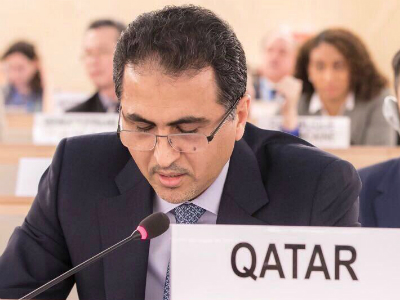State of Qatar Affirms its Opposition Against Racism, Discrimination, Xenophobia

Geneva / Information Office / September 25
The State of Qatar has affirmed its rejection of all forms of racism, racial discrimination, xenophobia and related intolerance whether taken at the national level or within the framework of international policies, they are considered a serious violation of all human rights and fundamental freedoms.
This came in a speech delivered by HE Permanent Representative of the State of Qatar to the United Nations Office in Geneva Ali Khalfan Al Mansouri during the 42nd session of the Human Rights Council's general debate under Item 9 entitled on racism, racial discrimination, xenophobia and related forms of intolerance.
Al Mansouri said that what increases the risk of discriminatory measures and policies is their adoption in a manner that has an effect outside territorial limits and are imposed by force of law, making it difficult to challenge before national litigation, especially in the absence of a fair and impartial judiciary that will decide on the legitimacy of these measures and the justice of those affected.
He added that the coercive discriminatory measures have been imposed by the blockading countries against Qatar and its citizens since June 2017, adding that despite the negative impact of these measures on the human rights of Qatari individuals and families belonging to these countries, blockading countries continue to make flimsy arguments to justify the measures that were taken.
In that regard, the State of Qatar welcomed the recent declaration by the Committee on the Elimination of Racial Discrimination of the admissibility of complaints submitted by the State of Qatar against Saudi Arabia and the United Arab Emirates, and its competence to deal with such complaints.
HE the Ambassador added that the emergence of new types of human rights violations in the context of the crisis, namely the registration of cases of enforced disappearance and arbitrary detention of Qatari citizens, as is happening now in Saudi Arabia, is of particular concern and that it can't and won't be tolerated. He stated that given the bleak human rights record in these countries, which the Human Rights Council and its mechanisms regularly and continuously review, there are renewed fears of further abuses.
HE the Ambassador called on the UN Human Rights Council and its mechanisms to act urgently and effectively to put pressure on those States to put an end to such measures, stop such violations and comply with their international and regional human rights obligations.

